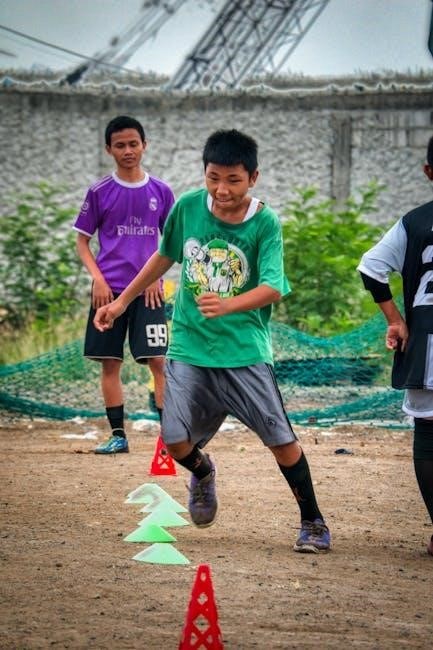Short-term team training is a focused approach to equip individuals with essential skills and cultural awareness for impactful service․ It prepares teams for specific missions efficiently․
1․1 Importance of Short-Term Team Training
Short-term team training is crucial for ensuring that teams are well-prepared to meet their mission objectives effectively․ It fosters cultural awareness‚ equips members with necessary skills‚ and enhances collaboration․ This training also ensures safety by addressing potential risks and protocols․ By focusing on both practical and emotional readiness‚ it empowers individuals to serve confidently and responsibly․ Ultimately‚ short-term team training is essential for creating a cohesive‚ impactful‚ and sustainable experience for all participants․
1․2 Key Objectives of a Short-Term Training Program
The primary objectives of a short-term training program are to prepare teams for their mission‚ enhance cultural awareness‚ and ensure safety․ These programs focus on fostering collaboration‚ equipping members with practical skills‚ and promoting leadership development․ They also aim to address risk management and ensure readiness for diverse environments․ By achieving these goals‚ the training enables teams to execute their tasks effectively and make a meaningful impact․ The objectives are designed to empower individuals to serve responsibly and confidently‚ ensuring a cohesive and successful experience․

Key Considerations for Short-Term Team Training
Critical factors include mission alignment‚ cultural preparation‚ and safety protocols․ These elements ensure effective training and successful mission execution․

2․1 Understanding the Mission and Goals

Understanding the mission and goals is crucial for short-term team training․ It ensures everyone is aligned with the objective‚ fostering a unified approach․ Clear goals guide preparation and execution‚ maximizing impact․ This step involves defining specific outcomes and ensuring all team members comprehend their roles․ Without a well-defined mission‚ efforts may lack direction․ Leaders must communicate objectives clearly to avoid confusion․ A shared understanding enhances collaboration and focus‚ leading to a more successful mission․ It also helps in measuring progress and evaluating outcomes effectively․ Thus‚ mission clarity is foundational for any short-term training program․
2․2 Cultural Preparation and Awareness
Cultural preparation and awareness are vital for short-term team training‚ ensuring effective engagement with diverse environments․ Understanding local customs‚ values‚ and communication styles helps avoid misunderstandings and builds trust․ Teams must research the host culture‚ including etiquette‚ language basics‚ and social norms․ Training should address cultural sensitivities and encourage open-mindedness․ This preparation fosters mutual respect and strengthens relationships with local communities․ Leaders should emphasize the importance of adaptability and humility․ Cultural awareness not only enhances the team’s effectiveness but also enriches their personal growth․ It is a cornerstone of successful short-term missions‚ enabling teams to serve respectfully and collaboratively․

2․3 Safety Protocols and Risk Management
Safety protocols and risk management are critical components of short-term team training․ Teams must be equipped with strategies to mitigate potential risks‚ ensuring the well-being of all members․ A thorough risk assessment should be conducted‚ identifying possible threats such as health hazards‚ political instability‚ or environmental risks․ Clear safety guidelines‚ including emergency response plans and communication protocols‚ should be established and communicated to the team․ Training should also cover basic first aid‚ crisis management‚ and evacuation procedures․ Additionally‚ teams must comply with local laws and regulations․ Preparedness is key to minimizing risks and ensuring a secure environment for effective service and collaboration․ Proper training fosters confidence and readiness for unforeseen challenges․

Pre-Training Preparation
Pre-training preparation involves assembling the team‚ gathering essential resources‚ and aligning all efforts with the mission’s goals․ This phase ensures everyone is prepared and informed․
3․1 Assembling the Team
Assembling the team is a critical step in pre-training preparation․ It involves selecting members with diverse skills and strengths to ensure a well-rounded group․ Team leaders must assess individual capabilities and align them with the mission’s requirements․ Clear communication of roles and expectations is essential to foster unity and purpose․ Additionally‚ team members should be encouraged to attend all training sessions to ensure they are adequately prepared for the challenges ahead․ This collective effort lays the foundation for a cohesive and effective team dynamic‚ which is vital for the success of the short-term mission․
3․2 Essential Resources and Materials
Essential resources and materials are vital for the success of short-term team training․ These include training manuals‚ cultural preparation guides‚ and safety protocols․ Practical tools like first aid kits and communication devices are also crucial․ Additionally‚ teams should have access to checklists‚ debriefing guides‚ and financial FAQs to ensure smooth operations․ These resources help the team stay prepared‚ informed‚ and aligned with the mission’s goals․ By providing these materials‚ leaders can enhance the team’s effectiveness and readiness for the challenges they will face during their short-term assignment․
Execution of the Training Program
Effective execution involves implementing hands-on activities‚ leadership exercises‚ and cultural immersion․ Teams engage in practical tasks to enhance skills and adaptability‚ ensuring mission readiness and alignment with goals․
4․1 Leadership Development
Leadership development is crucial for effective team management during short-term missions․ Training focuses on fostering strong communication‚ decision-making‚ and problem-solving skills․ By empowering individuals to lead confidently‚ teams achieve cohesive results․
4․2 Practical Skills and Hands-On Activities
Practical skills and hands-on activities are essential for preparing teams to handle real-world challenges․ These exercises focus on building specific competencies relevant to the mission‚ such as problem-solving‚ cultural adaptation‚ and task execution․ Workshops‚ simulations‚ and role-playing scenarios are commonly used to enhance learning․ By engaging in these activities‚ team members gain confidence and proficiency in applying their skills; This approach ensures that participants are well-prepared to tackle the demands of their assignments effectively․ Hands-on training also fosters collaboration and adaptability‚ which are critical for success in diverse and dynamic environments․ The goal is to bridge the gap between theory and practice‚ enabling teams to perform at their best․

Post-Training Debriefing and Follow-Up
Post-training debriefing involves evaluating outcomes‚ gathering feedback‚ and fostering continuous improvement․ Follow-up sessions ensure sustained growth and engagement‚ helping teams reflect and refine their skills effectively․
5․1 Evaluating the Impact of the Training
Evaluating the impact of short-term team training involves assessing the effectiveness of the program through surveys‚ feedback‚ and performance metrics․ This step ensures that the training met its objectives and identifies areas for improvement․ By gathering insights from participants and leaders‚ the evaluation process helps measure skill development‚ cultural awareness‚ and team cohesion․ It also provides valuable data to refine future training programs and enhance overall outcomes․ Effective evaluation ensures that the training not only meets immediate goals but also supports long-term growth and engagement for the team members․ This feedback loop is crucial for maintaining the quality and relevance of the training initiative․
5․2 Encouraging Ongoing Growth and Engagement
Encouraging ongoing growth and engagement after short-term team training is essential for sustaining the impact of the program․ This involves providing resources for continued learning‚ such as access to additional training materials‚ mentorship opportunities‚ and peer support networks․ Regular check-ins and feedback loops help team members reflect on their experiences and apply the skills they’ve gained․ By fostering a culture of continuous development‚ individuals are empowered to grow both personally and professionally․ Encouraging engagement through alumni groups or community platforms also helps maintain connection and motivation․ This ensures that the benefits of the training extend beyond the short term‚ fostering lifelong growth and service․